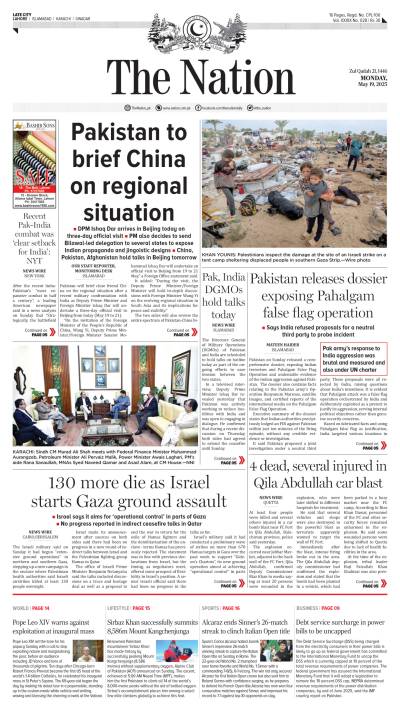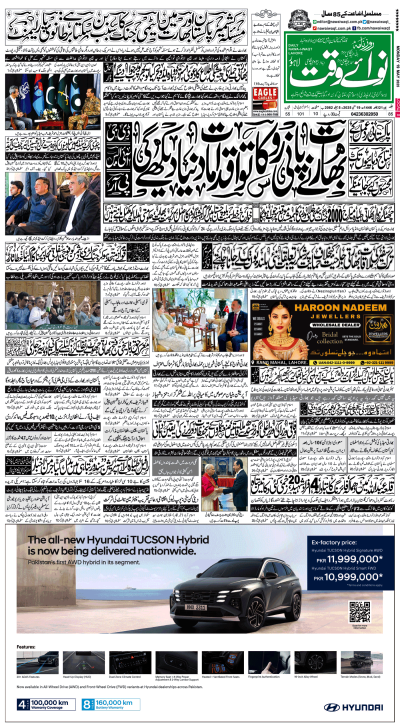For the Obama administration to insist that as a committed ally in the fight against terrorism, Pakistan must put in its best to root out the spreading scourge would be quite justified. The quantum of aid is relevant, but to what extent is an open question. After all, the frightening phenomenon it not just a US concern; it visits Pakistan much too often for it to have any reservations about countering it. Nevertheless, it is logical to expect that as the Americans, with the horrific memory of 9/11 very much alive in their minds, are mortally scared of its recurrence and believe that in the "safe havens" near Pak-Afghan borders lie the threatening potential, they should be extending all possible help to Pakistan to get out of its current economic and political predicament. Only once freed from this nagging worry, it would be in a position to utilise the capabilities it has to meet the challenge. Political stability and economic revival will engage people in healthy pastimes, make for security of life, create more jobs and provide better healthcare and good schooling and would thus serve as a natural restraint on the fanatical pursuit of militancy. Trying to exploit Pakistan's weaknesses by attaching conditions to the American assistance would reinforce the uneasy relationship already existing between the two countries. The US is unhappy with Pakistan because it believes that it is not doing enough to contain militancy; Pakistan, on the other hand, has a valid grouse about the growing US trend to pamper India without taking into account its vital interests. For the people of Pakistan and Kashmir, the hope that candidate Barack Obama created about the resolution of the Kashmir dispute has vanished after he entered the White House. The question now is that if he could give way to the pressure from the Indian lobby and take the Kashmir issue out of the equation of militancy from the region and yet believe that he could block all channels of the phenomenon to develop and grow, is he not deceiving himself? This fateful compromise would prove too formidable an obstacle to overcome in the context of bringing about good neighbourly relations between India and Pakistan, so necessary to eliminate the chances of its resurgence. Defying all hope that President Obama would bring a breath of fresh air to the subcontinent, he has tamely eschewed any reference to Kashmir, which remains a constant source of Indo-Pakistan hostility and tension. In the process, President Obama's efforts to neutralise the hatred of the US that Mr Bush's anti-Muslim policies had caused among an overwhelming population of Pakistan would not make much headway. The drone strikes that are being carried out in a more determined spirit would make matters worse. On the other hand, the loud trumpeting of financing development works - schools and colleges, hospitals and clinics, roads and bridges, and other infrastructural projects to make employment opportunities available - through the tripling of the economic aid to $1.5 billion a year ($7.5 billion in the next five years) has finally appeared in the form of the Pakistan Enduring Assistance and Cooperation Enhancement (PEACE) bill. Tagged to the bill (also known as the Kerry-Lugar bill) introduced by Democratic Representative Howard Berman from California are certain unsavoury conditions that any government in Islamabad could accept at the peril of survival. Buying the Indian line, it demands Pakistan "not to support any person or group that conducts violence, sabotage, or other activities meant to instil fear or terror in India'. Apparently, there is an indirect assumption that at present Pakistan is involved in supporting such activities. That would give a whip in New Delhi's hand to lash at Islamabad whenever it wishes to blame it for a terrorist incident in the country or even the disputed state of Jammu & Kashmir and demand the suspension of aid. Another condition obliges Pakistan "to ensure access of United States investigators to individuals suspected of engaging in worldwide proliferation of nuclear materials, and restrict such individuals from travel or any other activity that could result in further proliferation." The reference indisputably is to Dr A Q Khan, and providing access to him is a highly sensitive issue that would provoke nation-wide adverse reaction, which would be difficult to contain. Time and again, Islamabad has assured the US and the international community that all relevant information has been rendered to them and time and again the suggestion of access has been turned down. To raise it once again and make the aid contingent upon its compliance, an aid that is ostensibly being given to help Pakistan improve its economic prospects to be able to fight the terrorist menace yet would also ultimately go to serve Washington interests, is highly uncalled for. Insistence on its compliance would prove futile and queer the pitch of US-Pakistan relations. It is good, however, to hear Senator John Kerry, who is Chairman of the US Senate Foreign Relations Committee and is currently on a visit to Islamabad, hold out the assurance to Pakistani authorities, which had taken exception to the wording of the bill, that the assistance would not have any strings. It raises the prospect of the deletion of these clauses when the bill is debated in the Senate. E-mail: mqkay@yahoo.co.uk
Monday, May 19, 2025
Asking for too much
-
Lahore emerges among safest global cities in Numbeo 2025 index
-
Lahore emerges among safest global cities in Numbeo 2025 index
-
India’s suspension of Indus Water Treaty legally baseless
-
Seventh polio case reported in Pakistan amid nationwide vaccination drive
-
Pakistan reports sixth polio case of 2025
-
PTA begins issuing VPN licences to regulate usage
Regional Reset
May 19, 2025
Peak Potential
May 19, 2025
United Front
May 19, 2025
Culture Shift
May 18, 2025
Tactical Shift
May 18, 2025
Pakistan’s Strategic Edge
May 19, 2025
Lessons for India
May 19, 2025
Galiyat’s Poor Network Services
May 19, 2025
A City in Neglect
May 19, 2025
Rising Cost of Living
May 19, 2025
ePaper - Nawaiwaqt
Nawaiwaqt Group | Copyright © 2025





